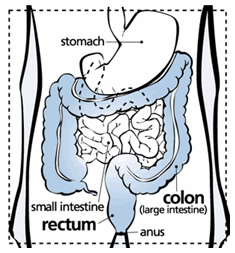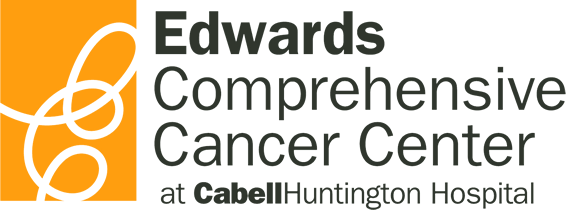Colorectal Cancer Program

Image source: CDC
Colorectal cancer is cancer that occurs in the colon or rectum. Sometimes it is called colon cancer, for short. The colon is the large intestine or large bowel and the rectum is the passageway that connects the colon to the anus.
Colorectal cancer affects men and women of all racial and ethnic groups, and is most often found in people aged 50 years or older. In the United States, it is the third most common cancer for men and women. Colorectal cancer is the #2 cancer killer in the US among cancers that affect both men and women, but it doesn't have to be! Screening can find abnormal growths so they can be removed before they turn into cancer. Screening can also find colorectal cancer early when it is easiest to treat.
The Colorectal Cancer Program
At the Edwards Comprehensive Cancer Center, the key word is collaboration. The Colorectal Cancer Program is structured so that on the first clinic visit, each patient is seen by the medical oncologist, the surgical oncologist and the radiation oncologist all on the same day in the same place. The physicians can then collaborate in developing an individual plan of care for the patient during that first visit. With just one facility and one electronic medical record, each physician has access to the same information, allowing the team to come to the same conclusion and provide the best treatment for the patient. And if patients need additional testing, the Lab and the Radiology Department are just a few hallways away.In traditional cancer care, a patient diagnosed with colorectal cancer may have three different appointments with three separate physicians in different locations. The doctors then have to share information and discuss the patient's treatment with each other, as well as any other specialists involved in the patient's care.
Another benefit of the Colorectal Cancer Program is having a dedicated nurse navigator for patients throughout their treatment and beyond. The nurse navigator for the Colorectal Cancer Program is the main point of contact for each patient and can navigate patients and their families through the new and sometimes frightening world of cancer diagnosis and treatment. In addition to offering support, she reviews the treatment plan with the patient and family, explains what to expect at the next appointment and shares educational materials about colorectal cancer and treatment, making the experience easier and less stressful for everyone. She helps patients make informed decisions about their care, answers their questions and serves as their educator, advocate and guide.
To help reduce your risk of colorectal cancer, please review the risk factors and symptoms.
